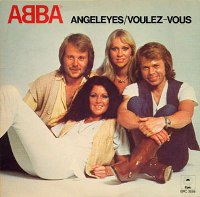Angeleyes
| "Angeleyes" | ||||
|---|---|---|---|---|
 |
||||
| Single by ABBA | ||||
| from the album Voulez-Vous | ||||
| A-side | "Voulez-Vous" | |||
| Released | 2 July 1979 | |||
| Format | Single | |||
| Recorded | 26 October 1978 at Polar Music Studio | |||
| Genre | Disco, pop | |||
| Length | 4:20 | |||
| Label | Epic | |||
| Writer(s) |
Benny Andersson Björn Ulvaeus |
|||
| Producer(s) | Benny Andersson Björn Ulvaeus |
|||
| ABBA singles chronology | ||||
|
||||
"Angeleyes" (also known as "Angel Eyes") is a pop song written and recorded in 1978 by Swedish group ABBA. Released as a double A-side with "Voulez-Vous" in 1979, coming from the album of the same name, the lyrics and music were composed by Benny Andersson and Björn Ulvaeus. It is known as one of ABBA's most popular tracks in the United Kingdom, becoming a Top 40 hit that peaked at the country's number three spot.
Lyrically, the track is a sentimental ballad in which the protagonist beseeches women to avoid the deceptively innocent looking gaze of a handsome yet deceitful man, warning them to beware the "game he likes to play". The vocals came from Ulvaeus with Agnetha Fältskog and Anni-Frid Lyngstad. The main working title for the song was "Katakusom". Over the years, it has appeared in various musical collections such as The Definitive Collection (2001) and The Albums (2008).
In the United Kingdom, "Angeleyes" was released as a double A-side with "Voulez-Vous". This being an unusual move for the group, ABBA and the personnel at Epic, the group's British record label, believed that with its classic ABBA arrangement "Angeleyes" would be considerably popular with the record buying public. No promotional video for the track was made. As ABBA had filmed one for "Voulez-Vous", it was this that was used to promote the AA side single.
The "Angeleyes"/"Voulez-Vous" single was the first ABBA single in the UK to feature a picture sleeve, although ABBA had previously issued picture sleeves in other countries. All of Epic's previous ABBA UK single releases were issued in plain company sleeves, which were yellow until 1976 when they changed to orange during a revision of Epic's label design. The single was also issued in several different colours of vinyl, and marked a change in Epic's presentation of their then most profitable act.
...
Wikipedia
